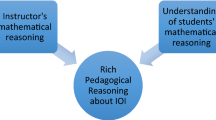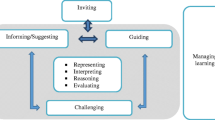Abstract
As part of my extended conversation with a high school mathematics class, I prompted the students daily to become ever more aware of their classroom language practices. This interaction showed how “critical language awareness” conversations can draw out student perspectives on mathematics learning and demonstrated how language awareness can afford students new possibilities for living in their mathematics classroom discourse. Students worried that others would feel left behind if they did not understand what to do when the word “just” was used to replace description of a mathematical procedure. Other students noted that “just” helps a teacher or student highlight particular aspects of an explanation because the word can gloss over routine procedure. The teacher’s dilemma of deciding what to elaborate and what not to elaborate is an instance of the contentious nature of Grice’s conversation maxims.
Résumé
Dans le cadre de longues conversations que j’ai eues avec une classe de mathématiques au secondaire, j’incitais tous les jours les étudiants à prendre de plus en plus conscience de leur pratique du langage dans la salle de classe. Cet échange a montré que les conversations visant à affiner “la conscience critique du langage” sont en mesure de faire ressortir les perspectives des étudiants sur l’apprentissage des mathématiques, et que la conscience du langage peut leur offrir de nouvelles façons de vivre le discours mathématique en classe. Les étudiants s’inquiétaient du fait que d’autres pourraient se sentir dépassés s’ils ne savaient que faire lorsque le mot “just” (“seulement”) était utilisé pour remplacer la description d’un procédé mathématique. D’autres élèves ont remarqué que ce mot aide les enseignants ou les étudiants à mettre l’accent sur certains aspects particuliers d’une explication parce que cela leur permet de “glisser” sur les procédés mathématiques courants. Les décisions des enseignants sur ce qu’il doivent ou non expliciter illustrent bien la nature controversée des maximes de conversation de Grice.
Similar content being viewed by others
References
Adler, J. (2001). Teaching mathematics in multilingual classrooms. Dordrecht: Kluwer.
Bakhtin, M. (1986). The problem of speech genres. In C. Emerson & M. Holquist (Eds.), Speech genres and other late essays (pp. 60–102). Austin, TX: University of Texas Press. (Original work published 1953)
Bakhtin, M. (1981). The dialogical imagination (C. Emerson & M. Hoquist, Trans.). Austin, TX: University of Texas Press. (Original work published 1975)
Bills, L. (2000). Politeness in teacher-student dialogue in mathematics: A socio-linguistic analysis. For the Learning of Mathematics, 20(2), 40–47.
Channell, J. (1994). Vague language. Oxford: Oxford University Press.
Chouliaraki, L., & Fairclough, N. (1999). Discourse in late modernity: Rethinking critical discourse analysis. Edinburgh: Edinburgh University Press.
Ellsworth, E. (1997). Teaching positions: Difference, pedagogy, and the power of address. New York: Teachers College Press.
Evans, J. (2000). Adults’ mathematical thinking and emotions: A study of numerate practice. London: Taylor & Francis.
Fairclough, N. (Ed.). (1992). Critical language awareness. London: Longman.
Fiori, N., Boaler, J., Cleare, N., DiBrienza, J. & Sengupta, T. (2004). What discussions teach us about mathematical understanding: Exploring and assessing students’ mathematical work in classrooms. In D. McDougall & J. Ross (Eds.), Proceedings of the 26th Annual Meeting of the North American Chapter of the International Group for the Psychology of Mathematics Education (Vol. 2, pp. 491–498). Toronto.
Gattegno, C. (1984). Curriculum and epistemology. For the Learning of Mathematics, 4(2), 33–38.
Gerofsky, S. (2004). A man left Albuquerque heading east: Word problems as genre in mathematics education. New York: Peter Lang.
Hannula, M., Evans, J., Philippou, G., & Zan, R. (2004). Affect in mathematics education—Exploring theoretical frameworks. In M. Johnsen Høines & A. Berit Fuglestad (Eds.), Proceedings of the 28th Conference of the International Group for the Psychology of Mathematics Education (Vol. 1, pp. 107–136). Bergen, Norway.
Herbel-Eisenmann, B. (2007). From intended curriculum to written curriculum: Examining the “voice” of a mathematics textbook. Journal for Research in Mathematics Education, 38(4), 344–369.
Hewitt, D. (2001). Arbitrary and necessary: Part 3 educating awareness. For the Learning of Mathematics, 21(2), 37–49.
Kress, G. (1990). Critical discourse analysis. Annual Review of Applied Linguistics, 11, 84–99.
Kress, G. (1993). Against arbitrariness: The social production of the sign as a foundational issue in critical discourse analysis. Discourse and Society, 4(2), 169–191.
Levinson, S. (1983). Pragmatics. New York: Cambridge University Press.
Morgan, C. (1998). Writing mathematically: The discourse of investigation. London: Falmer.
O’Connor, M., & Michaels, S. (1996). Shifting participant frameworks: Orchestrating thinking practices in group discussion. In D. Hicks (Ed.), Discourse, learning and schooling (pp. 63–103). Cambridge: Cambridge University Press.
Pimm, D. (1987). Speaking mathematically: Communication in mathematics classrooms. London: Routledge & Kegan Paul.
Rowland, T. (2000). The pragmatics of mathematics education: Vagueness in mathematical discourse. London: Falmer.
Sfard, A. (2001). There is more to discourse than meets the ears: Looking at thinking as communicating to learn more about mathematical learning. Educational Studies in Mathematics, 46(1–3), 13–57.
Skovsmose, O., & Borba, M. (2000). Research methodology and critical mathematics education. Roskilde, Denmark: Centre for Research in Learning Mathematics, Roskilde University.
Skovsmose, O., & Borba, M. (2004). Research methodology and critical mathematics education. In P. Valero & R. Zevenbergen (Eds.), Researching the socio-political dimensions of mathematics education (pp. 207–226). Dordrecht, The Netherlands: Kluwer.
Valero, P. (2004). Postmodernism as critique to dominant mathematics education research. In M. Walshaw (Ed.), Mathematics education within the postmodern (pp. 35–54), Greenwich, CT: Information Age Publishing.
Valero, P., & Vithal, R. (1998). Research methods of the “north” revisited from the “south.” In A. Olivier & K. Newstead (Eds.), Proceedings of the 22nd Conference of the International Group for the Psychology of Mathematics Education (Vol. 4, pp. 153–160). Stellenbosch, South Africa.
Wagner, D. (2007). Students’ critical awareness of voice and agency in mathematics classroom discourse. Mathematical Thinking and Learning, 9(1), 31–50.
Weingrad, P. (1998). Teaching and learning politeness for mathematical argument in school. In M. Lampert & M. Blunk (Eds.). Talking mathematics in school: Studies of teaching and learning (pp. 213–237). Cambridge: Cambridge University Press.
White, P. (2003). Beyond modality and hedging: A dialogic view of the language of intersubjective stance. Text, 23 (2), 259–284.
Author information
Authors and Affiliations
Corresponding author
Additional information
This article was accepted by Dr. Gila Hanna.
Rights and permissions
About this article
Cite this article
Wagner, D. “Just Go”: Mathematics Students’ Critical Awareness of Routine Procedure. Can J Sci Math Techn 8, 35–48 (2008). https://doi.org/10.1080/14926150802152236
Published:
Issue Date:
DOI: https://doi.org/10.1080/14926150802152236




